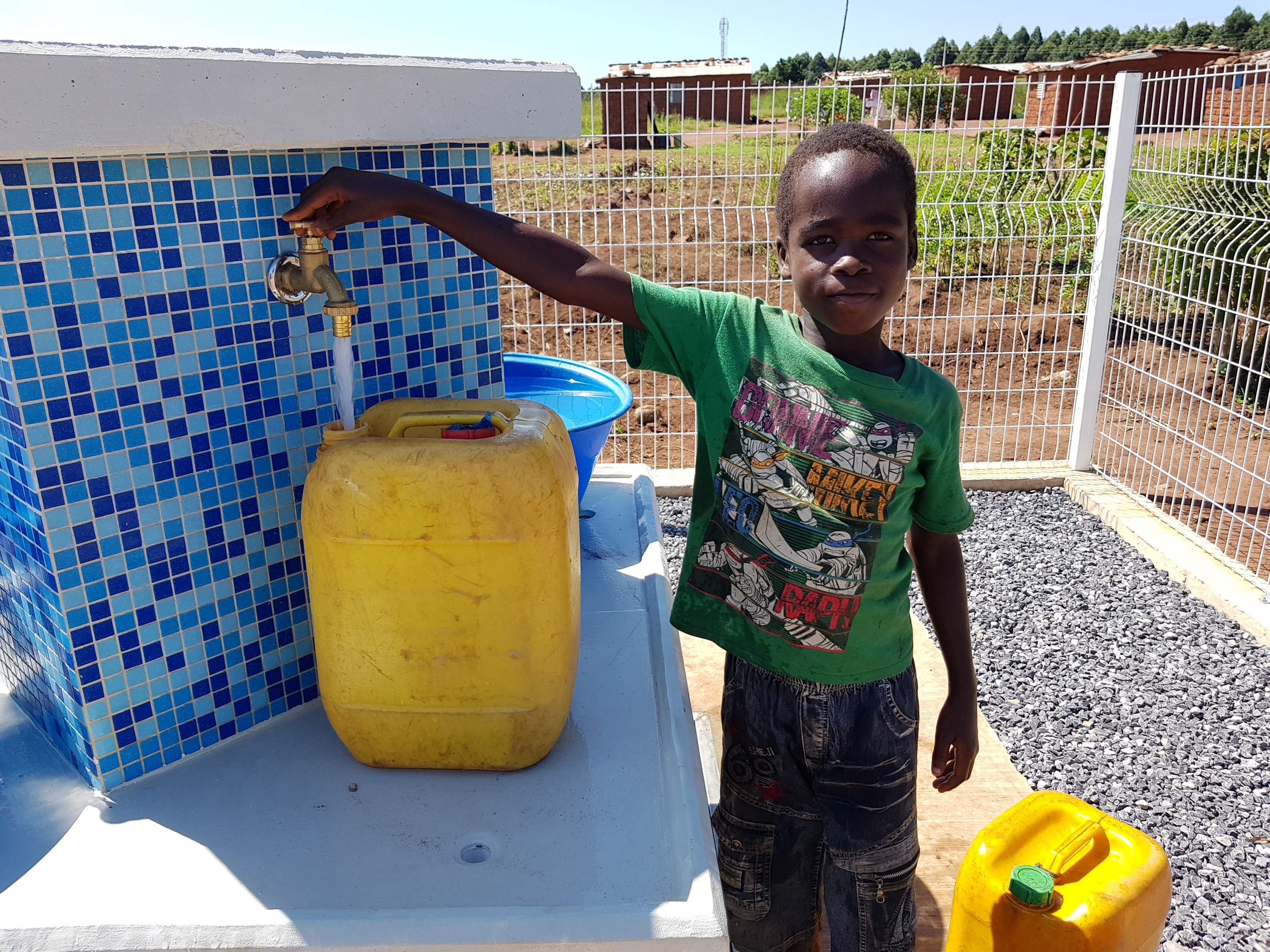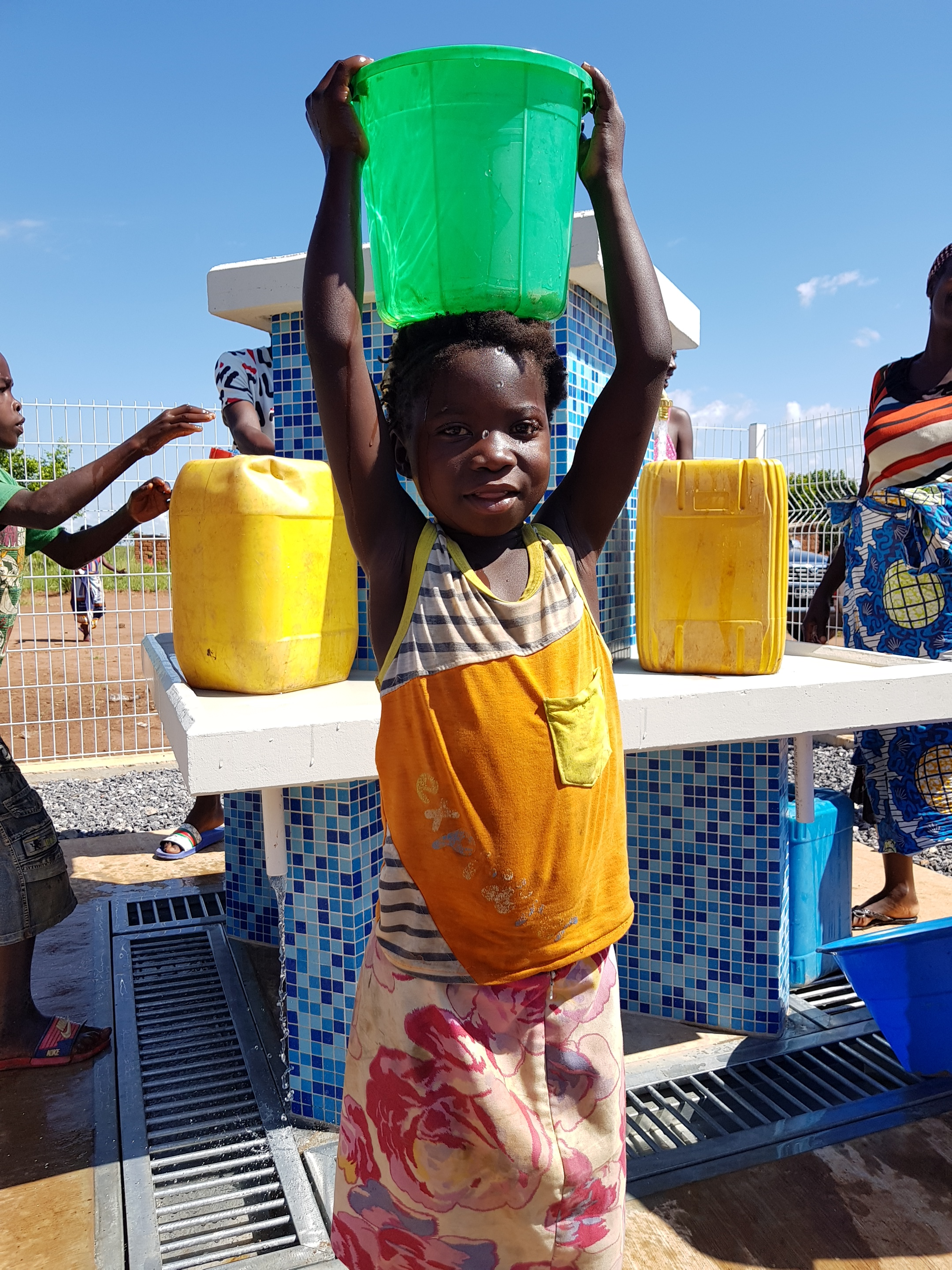By loading the video, data will be sent to YouTube. More information can be found in our data protection policy.
Nexus Blog // Supplying water to remote, drought-plagued areas in Angola - When creativity meets innovation in Africa
Owini, a company in the Mitrelli Group, implemented an innovative water desalination system based entirely on solar energy, within the village Ombala yo Mungu in southern Angola, West Africa. The province is characterized by extensive and arid terretories and was hit by a severe drought that the region has endured since 2018. The water desalination system is able to conserve the energy produced during the day, and allows continuous operation of pumping and supplying water to the community around the clock.

Water desalination system in Ombala yo Mungu @Owini
Supplying water to the population may be something we take for granted, but when it comes to a huge African country whose vast area covers extensive regions that differ substantially in their precipitation and water sources, the solutions for a regular supply of drinking water become complex, difficult to implement, and more costly.
Water is an essential resource for maintaining life, and today this resource is becoming increasingly scarce. For this reason, in the most inaccessible and arid regions of the world people and animals live with a constant shortage of water, causing great suffering. Cunene is the southern province of Angola, in Western Africa, bordering Namibia and characterized by extensive and arid territories. The prolonged drought in southern Angola has hit this province, affecting some 80% of the local population, including the animals, which died in their multitudes. As a result of the severe drought that the region has endured since 2018, it was recognized as a global disaster area and received national and international priority, until during 2019, the President of Angola visited the suffering province to assess and respond to the plight of its residents. The president went to a small village called Ombala yo Mungu, where he assured the residents that he would do his best to give them and the animals around them a source of drinking water.
Following the President's visit, and on his instruction, the Angolan Ministry of Water approached a number of international companies to provide an urgent response to the water crisis in the area. Owini, a company in the Mitrelli Group, rose to the challenge and went out to the village, which is hundreds of kilometers from populated areas, for a number of days to carry out a survey in the field in order to understand how to solve the problem of drinking water and provide the most appropriate solution.
Following its initial survey, Owini realized that there were two problems:
- There is no potable water in or around the area, and in fact there is only saline groundwater at a great depth
- There is no energy available in the electricity grid to operate water systems, and because of the distance from other populated areas the supply of fuel for generators is extremely problematic

In order to verify the matter, Owini carried out a large number of water tests in the field, including in old drillings from the Portuguese period, and indeed found beyond a doubt that it was brackish water. At this stage, the whole concept of the project changed from the standard installation of a drinking water supply system to a brackish water desalination system, which posed a complex planning, logistical and economic challenge, in addition to the difficulty of operating and maintaining such a system in a remote southern, arid region of Africa.
Subsequently, the decision was made that a quick solution for desalination was required, with an independent capacity for energy production and storage in order to provide a solution even when the sun is not shining. The facility must also include the ability to store water for several days in the event of a protracted malfunction, until a technician can arrive, due to the distance of the village from populated areas. In addition remote control and monitoring capabilities must be installed, in order to enable information about malfunctions to be received, and in many cases also to be handled without the need to send a technician out to the area.
The planned solution is an innovative water desalination system based entirely on solar energy, that is able to conserve the energy produced during the day, and allow continuous operation of pumping and supplying water around the clock.
A water storage facility has also been set up to provide a solution and create redundancy of the system for three working days (minimum) even without pumping water. Again, as mentioned above, this is in order to allow for a repair that necessitates a skilled professional going out to the area, which is about a three-day drive from Luanda, the capital of Angola.
In terms of the technology, the system involves two drillings in order to create a continuous throughput, a container with the desalination elements and batteries for energy storage during sunlight and its discharge to the various elements, and solar panels for all operations - pumping, desalination, and conduction of the water to the drinking elements in the village from a ground reservoir that is sufficient for three days, with an independent pumping station (which is also solar).
In fact the project includes 2 technologies:
- The reverse osmosis water desalination process, in which salts are separated from water (brackish groundwater in this case) by means of a membrane – to produce drinking water.
- Solar energy production for operating the desalination process, and to push the water under pressure from the pump to the reservoir, and from there to the drinking facilities around the village - using photovoltaic panels that absorb energy from the sun during the day, and deep cycle batteries to store some of this energy for use during the night.
By combining these two technologies together, it is possible to supply good quality water for the residents of a very remote settlement where there is no potable water, regular electricity supply, or conventional energy sources such as diesel fuel.
In addition, it is possible to follow the system’s performance through a remote control system that facilitates its proper operation, and monitor its operation from here in Israel.
The above solution was proposed by Owini to the Angolan Ministry of Energy and Water, and after its approval - the company embarked on the project.
It faced many challenges (floods that destroyed access roads, saline water, lack of energy sources), but the biggest of all, of course, was the coronavirus pandemic that paralyzed international activity. During this period it was very difficult to continue the planning and preparation work in the field, to produce the various containers and energy devices in Israel, despite the lockdowns and professional workers who were in prolonged isolation, to move the containers full of equipment from Israel to Angola, with the delays in shipping, and to move across Angola with special permits for travel and work, even during the lockdown forced by the pandemic on this suffering country. It can be said that every mishap that the company anticipated could happen, did happen. But proper planning, which took into account all the possibilities, enabled the project to be executed perfectly, and to the satisfaction of the client.
The state’s request for the implementation of the project was given to Owini in January 2020 with the condition that it be completed by the end of the year, and so it was.

The project was completed in November 2020 as planned. Drinking water, meeting European health standards, flows to the village for the benefit of the local residents and their livestock. Government officials and the local media come to visit, admiring the innovation and creativity of the project, which gives Owini great pride and a sense of satisfaction.
Following the great success of this project, and as a prototype project that is suitable for remote areas without a source of fresh water, there is a desire to replicate it in other areas in Angola, and Owini uses it to demonstrate solutions for other countries where there are settled areas with extreme climatic characteristics, a lack of available energy, and scarce water sources, similar to southern Angola.
The existing technological innovations are assimilated and operate in many countries around the world, and are an integral part of the range of solutions in these countries. However, it is possible to bring about a tremendous change in the quality of life of poor populations in Africa when Israeli innovations for solving the most significant challenges facing the developing world, together with creativity and a sense of mission, are implemented and bring about the desired solution. Just as they were applied and implemented in this project by Owini .
This project is part of a much larger project being carried out in Angola, called "Water for All". As the name implies, its purpose is to provide water and long-term, sustainable solutions for global water needs, and to improve the standard of living and health of the local population.
Owini is working to promote similar "Water for All" projects in other developing countries, and is about to start implementing them in two more countries in Western Africa.
Video

Website
Related Articles
- Return on Investment Case Study // Accelerating Solar Water Pump Sales in Kenya
- JRC Technical Report // Water-Energy-Food Nexus Interactions Assessment: Renewable Energy Sources to support Water Access and Quality in West Africa
- Nexus Blog // Food Security and Women Empowerment Through Solar-Powered Irrigation in Niger
